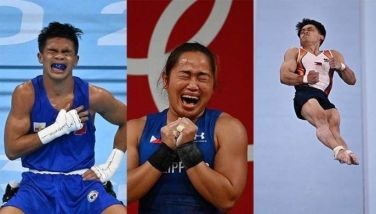Germany helps RP address climate change concerns
(First of two parts)
MANILA, Philippines - Climate change is a burning issue with social, economic and ecological concerns. Germany is addressing these global concerns with innovation, technological expertise and international commitment.
On the local front, the Philippine Clean Air Act and the milestone Renewable Energy Act set a precedent as the country endeavors to face up to its current environmental challenges. And as serious investments are being lined up to pursue these development goals, the country has reason to believe that fighting climate change is, in fact, achievable.
Germany is Europe’s capital for utilizing clean, renewable sources of energy. Further to this, it is the world’s first major renewable energy economy in terms on financial sustainability.
In 2007, Germany sourced over 14 percent of its energy requirements from renewable sources: wind, solar, hydro, biomass and geothermal. RE investments in the country was estimated at over 20 billion euros covering the installation and operation of new plants, further developing an industry that employs over 214,000 people. Germany is targeting to source 27 percent of its energy requirements from renewable sources by 2020.
German-RP cooperation
In the Philippines, the German government is helping address climate change-related concerns, among others, through its ODA agencies such as the GTZ (German Technical Cooperation), KfW Development Bank and other HR-oriented organizations such as the German Development Service (DED).
Last May, GTZ gathered national stakeholders for a policy dialogue, sending a serious message that the Philippines is highly vulnerable to climate change impacts.
The dialogue was part of a larger program called “Adaptation to Climate Change and Conservation of the Biodiversity in the Philippines (ACCBio)” being supported by the German Federal Ministry for Environment, Nature Protection and Nuclear Safety (BMU) — under its International Climate Protection Initiative — and implemented by the Department of Environment and Natural Resources (DENR) with technical assistance from GTZ.
In terms of preserving livelihood, conservation and adaptation measures under ACCBio will benefit poor small-scale farmers and fisherfolk in the Visayas as well as vulnerable groups located in buffer zones of protected areas.
By awarding small-project grants that protect the Philippines’ biodiversity, the program helps develop and execute adaptation strategies to fight the effects of global warming in the Philippines.
Since 2005 another GTZ program called “Environment and Rural Development” or EnRD has assisted Regions 6 and 8 in areas such as coastal fisheries, community forest management, disaster preparedness, and the improvement of services delivery.
Together with partner agencies, GTZ has sought to balance public and private interests by working closely with both government and families who own small-scale agriculture and forestry enterprises, fisherfolk, agrarian reform beneficiaries, the landless, and the informal sector.
“We understand that the struggle for sustainable development involves a process of ongoing negotiation, and that it has to be continuously replicated,” says GTZ country director Jochem Lange. Capacity-building and establishing the proper competence also plays a vital role for sustainable living in the Philippines.
“To complement sustainable development, we have a parallel goal of capacity development — in which we help people, organizations and societies mobilize and expand their ability to act,” Lange adds.
From 2009 to 2012, the ACCBio and EnRD projects taken together will mobilize support amounting to almost 10 million euros from the German Ministry for Economic Cooperation and Development (BMZ) and the BMU.
Various advisory, training, studies and pilot projects will make communities better able to manage natural resources in a sustainable manner. Their capabilities are being strengthened in such disciplines as land use and development planning, disaster preparedness, solid waste management as well as the management of forests, upland, coastal and fishery resources.
GTZ also currently has programs to help local government units (LGUs) establish sustainable solid waste management systems and ultimately reduce the degradation of natural resources.
Financing of investments in solid waste management by LGUs and private enterprises is available at the Development Bank of the Philippines (DBP) with funding support from KfW Development Bank.
GTZ also completed a four-and-a-half-year project together with the Philippine Economic Zone Authority (PEZA) to improve environmental management systems within special economic zones.
With funding from KfW, the Land Bank of the Philippines implements a program for financing investments in energy efficiency and climate protection.
This program is available for the private sector, LGUs, national government agencies and government-owned and controlled corporations.
In addition, technical support is financed for new chilling technology. Most of the air-conditioning devices being used in the Philippines utilize chlorofluorocarbons (CFCs) as cooling agent, the greenhouse effect of which is up to 4,500 times higher than that of carbon dioxide.
Apart from that, CFCs have a destructive effect on the ozone layer. Hence, the replacement of CFCs as cooling agent is targeted by this program.
Other general energy-efficient investments that would reduce electricity consumption, direct consumption of diesel, coal, gas, oil — and thereby reducing direct greenhouse gas emissions — are to be fostered as well.
As early as 1996, in cooperation with the DBP, KfW has provided funds for investments and technical support for small and medium-sized enterprises to invest in efficient production and environmentally sound technologies.
This Industrial Pollution Control Program was extended until 2005. With installation of cleaner technologies, waste disposal options and equipment to monitor emissions and effluents, KfW has early on promoted environmental protection and occupational health and safety. (To be continued)
- Latest




























